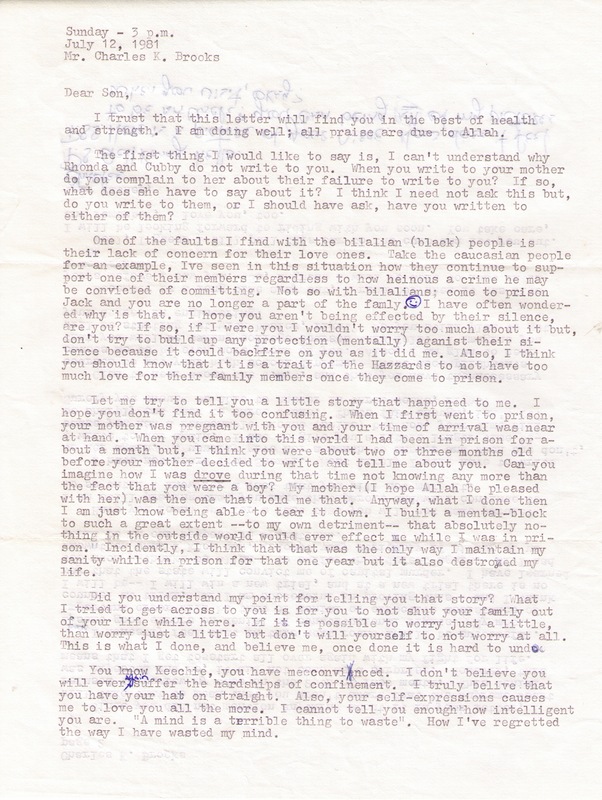The Court Rules: Case of Charlie Brooks, Jr.
"Everyone is entitled in full equality to a fair and public hearing by an independent and impartial tribunal, in the determination of his rights and obligations and of any criminal charge against him." Article 10, Universal Declaration of Human Rights
When one thinks about giving advice to their children it is rarely through a letter sent from jail. Yet, this was the reality of the Brooks family, when Charlie Brooks Jr. was convicted of murder. The challenge of the case rises from the insecurity and uncertainty of his guilt. As his son Derek Brooks reiterated in his interview, there were witnesses that confirmed his father was not in the room with the person who was killed. However, “the defense attorney never interviewed anybody… to prove the fatal shot.”
The Universal Declaration of Human Rights (UDHR) strongly emphasizes that everyone should be granted certain freedoms as human beings specifically under the law. Therefore, in this case it is manifest that article ten is violated. In his letter to his son Keith, Charlie Brooks Jr. clearly indicates that the Supreme Court refuses to look over his case. Furthermore, this is not the first time this has happened. Since the evidence behind his conviction is controversial, why is Charlie on death row fighting for his life?
Article ten explicitly states that individuals have the freedom to a just trial in order for them to be charged with a criminal offence. It uses words such as equality and fairness to underscore that the judicial system should be unbiased. However, Charlie Brook’s letter to Keith questions why this UDHR article is seemingly not applicable to his case when in fact it should not be conditional to single situations. This belittles the concept of universality. Moreover, the letter highlights that Brooks has gotten accustomed to the denial of his rights since he reminds Keith that this “denial was expected.” He is so used to this refusal that he cannot waste time dwelling on his misfortunes. Rather he utilizes his letters to learn more about Keith and advise him. Thus, he remains optimistic to maintain his relationship with his children and because his survival is determined by the court and most importantly, by his ability to remind its members of “his denial of constitutional rights” and his freedoms as a human being.
Derek Brook's Interview: https://tinyurl.com/mkh4dob
By: Allison McHayle
External locus of control refers to the extent in which people believe their life is in the control of outside factors rather than their own actions. Charlie Brooks Jr. fought for a life that inevitably was not in his hands, but rather in the hands of the court and lawyers. In the newspaper article discussing the opinions of several lawyers on the Supreme Court rulings, there was only one person who believed the case in deed should be reviewed. This was Brook's own defense attorney, Danny Burns, who realized the trial had many unfair and unbiased aspects. Although there is a violation of article ten of the Universal Declaration of Human Rights (UDHR), Brooks was still stripped of his human freedoms by his execution stay denial, which ultimately led to his death.
Burns highlighted several ways in which the hearing and conditions of the case were definitely far from being impartial. Brooks was given a lawyer unfamiliar with the case when his had a heart attack; he also had a juror removed from the case because of her inability to sentence people to death. Still with all of this into consideration, the value of human life was worth less than time needed to take these facts into consideration. Most of the attorney’s desired to just get the case over with or “bring the case to close.” Interestingly, it can be argued that those against Brooks thought they were actually preserving what they assumed was fair under the law. Nevertheless, since Brooks was on death row, this idea brings into question what makes a sanction for a crime worth human life. As a result, there is still this underlying principle of who “deserves” to be executed as well as the discussion that no one should be executed if there is not enough evidence or if there is uncertainty with the evidence. Additionally, in his interview, Derek Brooks, Charlie’s son, strongly pointed out “for two people to be involved in the same crime, and one person gets out and the other gets executed, that’s injustice.” This further emphasizes that there were countless infringements of article ten that still needed to be thought about. There were still several unanswered questions and answers that did not implicate Charlie Brooks Jr. Yet, on December 7, 1982 it was still adamant that his battle for life be lost.
Derek Brook's Interview: https://tinyurl.com/mkh4dob
By: Allison McHayle


